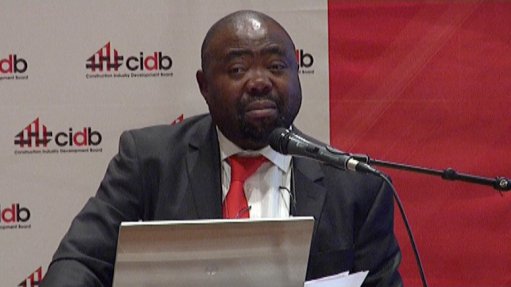
Pubic Works Minister Thulas Nxesi
The combined fine of R1.46-billion imposed on the group of 15 construction companies admitting to collusive tendering, was viewed in many quarters as merely a “slap on the wrist” and sent out the message that large firms could get away with fraud and corruption, Public Works Minister Thulas Nxesi on Friday.
The fines were agreed with the Competition Commission under its Construction Fast-Track Settlement Process, which was launched in February 2011. The commission found more than 300 cases of bid-rigging on projects concluded after 2006.
The involved contractors were, Aveng, Basil Read, Esorfranki, G Liviero, Giuricich, Haw & Inglis, Hochtief, Murray & Roberts, Norvo, Raubex, Rumdel, Stefanutti, Tubular, Vlaming and Wilson Bayly Holmes-Ovcon (WBHO).
Fines ranged from R155 850 for Esorfranki to over R300-million for Aveng, Murray & Roberts, Stefanutti and WBHO.
Speaking at a National Stakeholder Forum of the Construction Industry Development Board (CIDB), in Kempton Park, the Minister said the settlement agreement was significant.
“This kind of conduct is not only anti-competitive, but anti-transformative. Big companies close off opportunities to smaller companies. It also undermines the expected social and economic benefits arising from projects and represents a major setback to the efforts to transform the patterns of ownership in the construction industry,” Nxesi stated.
He said the findings by the commission pointed to underlying issues in the construction industry, which included slow transformation.
The Minister described views that drastic action against these large construction firms would create instability in the industry, as “misled”.
“Such views deliberately ignore the view that corruption is corruption, irrespective of wether the perpetrator is a big or small company.
“We need to be even-handed when stamping out corruption. Frankly, it may appear that we have different rules for big white-owned companies…But, if you are the black small ones, its straight for the jugular and you are out…morally the country cannot justify this,” the Minister stated.
He noted that while the Department of Public Works would respect the independent investigation of the CIDB into the cartel case, it would watch developments with interest.
“We are going to take whatever steps necessary to ensure that the construction industry is free of criminal tendencies.”
Nxesi further added that the commission’s findings represented an ideal opportunity for his department to establish systems and processes to eradicate collusive practices in the industry.
“We need to emerge from this crisis with a strategy and plan that promotes the partnerships that support objectives, which include sending a clear message that corruption and fraud will not be tolerated; seek to promote the best ethical practices in the construction sector…and lead transformation,” he urged.
Looking ahead, the Minister stated that the roll-out the national infrastructure development plans in the form of the National Growth Path, the Presidential Infrastructure Coordinating Commission, the Strategic Integrated Projects and the National Development Plan would require mobilisation of the country’s construction capacity, as well as partnerships at an unprecedented scale.
“The construction industry has the potential to create jobs and assist in addressing the country’s triple challenge of unemployment, poverty and inequality,” Nxesi added.
Meanwhile, CIDB chairperson Bafana Ndendwa said corruption had the potential to undermine growth and development in the local construction industry.
“We all have to have the integrity as an industry to fight corruption and collusion, no industry body can do it alone. But the question stands, are we doing enough?”